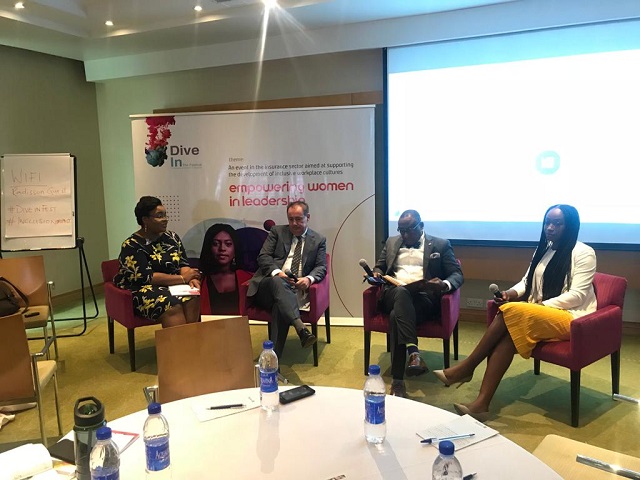An International advocacy group Inclusion@Lloyd’s, which focuses on inclusion and diversity in the insurance sector held the fifth edition of its annual Dive In festival in over 60 cities across 33 countries worldwide. The event held in Nigeria for the first time since its inception in 2015 at Radisson Blu Hotel Anchorage, Victoria Island.
Top executives from the insurance sector and the media were in attendance. This year’s festival focused on Empowering Women in Leadership in the insurance sector.
In his Keynote address, the Global Chairman, Aon, Dominic Christian cited the importance and need for inclusion and diversity in the workplace.
He identified the complex make up of society and how business environments should be a true reflection of the people they serve, in order to understand, develop and deliver better value offerings.
He elucidated the importance of entrenching inclusive leadership in workplace culture that supports people in being themselves. He also advocated for engagement of the brightest minds which incorporates diversity in solving modern-day challenges plaguing the world such as, globalization, climate change, and cybercrime.
Drawing insight from a research publication ‘The Athena Doctrine’, by John Gerzema and Michael D’Antonio, the event’s moderator Egbe Oyegun-Adeoye reiterated the high demand for increased feminine traits in the workplace as revealed by the research. She shed light on what organizations are missing when they limit themselves from tapping into more of feminine input in board rooms.
During her presentation she said, “How do we create space for everyone to do their best work? How do we create space for feminine characteristics, skills to have as loud a voice in the room as their masculine contemporaries? Because going forward, that’s what is needed to make the right customer decision, as well as employee decision. Inclusion is not about making space for others, rather it is what we lose when we don’t have the complete piece to solve the puzzle”.
The event also held a panel discussion on the festival’s theme ‘Empowering Women in Leadership’. The panel moderator Egbe Oyegun-Adeoye, Executive Director at Navigate Consulting Africa led the session which had Dominic Christian, Yomi Badejo-Okusanya, MD CMC Connect, and Bekeme Masade-Olowola, CEO CSR-In-Action on the conversation.
The panelists shared both personal and professional experiences on the challenges women face socially and professionally in Nigeria, and called for both individual and institutional changes to enable society access the full benefits of the potentials of women.
There was concensus among the panelists on the need for improved opportunities for women, to enable them thrive in their careers. Citing CBN’s policy that mandates banks to have 30 percent female representation on their boards, Yomi Badejo-Okusanya called for NAICOM to enact similar stipulation in the Insurance sector, compelling insurance firms to implement quota in gender representation at board level.
Speaking on the theme, Bekeme pointed to lack of adequate policies supporting women’s growth as well as socio-cultural factors inhibiting women from being empowered. She queried the constitutional discrimination against women working at night or restriction on women from working in mining operations, arriving at the conclusion that it is an indication that the rules are made predominantly by men.
Acknowledging that there has been marginal improvement in women’s rise to leadership positions in the private sector, she pointed to the fact that women only accounted for just 14 percent of the 915 Directors of the listed companies in Nigeria, marking an indication of the enormous work which lies ahead with respect to opportunities for women in leadership positions.
Offering his perspective on cultural and structural barriers that limit women and the conversation needed in the workplace to change the narrative, Yomi stated: “we cannot take away cultural milieu from this situation. A lot of women have been psychologically wired and tuned to do certain things such as cooking, cleaning, washing and looking after children, thereby stripping them of their identities.
Going forward, there has to be legislation to address this malaise, organizations should be guided by policies mandating them to allocate a certain number of positions to women, this is because women are at a disadvantage. Just as children are protected because of their vulnerability, women are somewhat vulnerable and need to be protected, they have the worst end of the stick. In addition to legislation, there is need for advocacy, as well as cultural and religious reorientation of society.












